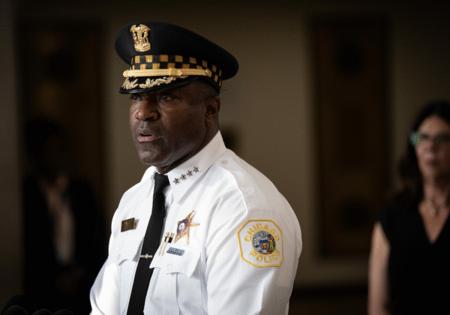Chicago top cop calls for 'communication' to avoid 'adversarial environment' if troops deployed
Published in News & Features
CHICAGO — Chicago police Superintendent Larry Snelling said Thursday he will not direct his officers to obstruct a potential federal crackdown on the streets but expressed hope that some communication with his department could lower tensions in a city already on edge.
The city’s top cop joined Mayor Brandon Johnson to brief reporters on the rumored influx of federal troops and law enforcement as President Donald Trump threatens to target Chicago next for a military occupation.
The two leaders said they have not heard from the White House.
But Snelling repeated that his door is open for the feds to inform him about any deployment, suggesting he wanted Chicago police to take on the least hostile role possible in order to mitigate some of the “chaos” that could erupt.
“If they’re here, communication between the CPD and the National Guard would be most helpful, because I think that’s where we can find some type of balance,” Snelling said. “There’s no need at this point to create an adversarial environment which could lead to violence.”
Snelling did not make clear in the Thursday news conference in what way he is concerned violence could manifest during a federal troop deployment in Chicago.
Police spokespeople did not immediately respond to a follow-up inquiry seeking clarification on his remarks.
Snelling’s proffered olive branch came after several days of local leaders such as Johnson and Gov. JB Pritzker decrying Trump’s plans to blanket Chicago with federal troops as illegal political posturing.
The mayor, asked multiple times Thursday morning to detail the directive for Chicago police if uninvited troops arrive, repeatedly said “their role doesn’t change.” Johnson then hewed to talking points about crime rates in Chicago going down.
“It looks like what we’ve been doing, and that’s why we have a 32% reduction in homicides and shootings,” Johnson said. “That’s what it looks like. They’ll continue to do their job to keep the people of the city safe.”
The mayor then deferred to Snelling, who maintained Police Department protocol would be hard to anticipate without communication from the National Guard and that the situation can “change on a dime.” But, the superintendent maintained, “the Chicago Police Department does not, cannot and will not interfere with the work that federal agents are doing.”
Snelling urged protesters to remain peaceful and “try not to obstruct or become physical with federal agents or members of the National Guard.”
The top cop also said until then, it is “impossible to answer” how police who also serve in the National Guard will be treated or what the department will do if federal authorities overstep. He did specify that his officers will be in uniform so they can be easily distinguished from federal troops or law enforcement.
Trump identified Chicago last week as “probably” the next city where he’d try to deploy troops to crack down on crime after he deployed 2,000 National Guard members in Washington D.C. earlier this month. His administration sent nearly 5,000 federal troops to Los Angeles in June during protests over federal immigration raids.
The vague, but increasingly substantial threat has put city leaders on edge as they brace for the often-aggrandizing president’s unclear plans.
A spokesman for Pritzker’s office said Thursday they still have not had any communication with Washington about any National Guard deployments.
Johnson reiterated the National Guard does not have “arresting authority or policing powers” but acknowledged that other federal agencies do. If federal agents do start making arrests in Chicago, he said, “the Police Department’s role is to do what it’s been doing, and that’s to serve folks and to protect folks.”
Snelling said his department is not yet canceling vacations, but is prepping to “have the manpower in place” and respond to protests. His department will continue to neither request nor report immigration status to federal authorities, he added.
And Johnson’s chief homelessness officer Sendy Soto said her office will distribute cards including about shelter and legal resources at homeless encampments Thursday.
“The city believes firmly that being unhoused is not a crime, so we will not be assisting with any sort of arrest or enforcement toward the unhoused community,” she said.
_____
(Tribune reporter Jeremy Gorner contributed to this story.)
_____
©2025 Chicago Tribune. Visit chicagotribune.com. Distributed by Tribune Content Agency, LLC.







Comments